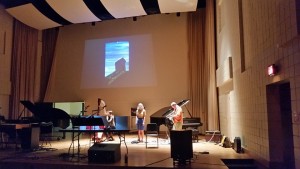UMW Music Well Represented at Root Signals Electronic Music Festival
 The University of Mary Washington was represented by Department of Music faculty, students and alumni at the 2015 Root Signals Electronic Music Festival at Jacksonville University in Jacksonville Florida. Root Signals is sponsored by the Division of Music at Jacksonville University, and the Department of Music at Georgia Southern University and featured guest percussionist Tony Steve for the three-day festival of electronic music and media art.
The University of Mary Washington was represented by Department of Music faculty, students and alumni at the 2015 Root Signals Electronic Music Festival at Jacksonville University in Jacksonville Florida. Root Signals is sponsored by the Division of Music at Jacksonville University, and the Department of Music at Georgia Southern University and featured guest percussionist Tony Steve for the three-day festival of electronic music and media art.
Mark Snyder, Assistant Professor of Music, performed his song cycle Facets of Love to close the festival on Saturday, September 12th. The performance featured Paige Naylor ’14: soprano, Becky Brown ’15: harp, Mark Snyder ’97: guitar, piano, synthesizer & electronics. The poems for Facets of Love were penned by Jeanine Casler, a faculty fellow at Hobart, Northwestern’s Women’s Residential College and the video was created by Anna Weisling, the Music Technology Specialist at The Juilliard School in New York. The first movement can be viewed below:
Junior Music major Austin O’Rourke performed his composition Hazel Colored Nebula during the Emerging Composers Concert on Thursday night, September 10th. His performance of this piece on UMW’s 2015 Undergraduate Research and Creativity Day can be viewed below:
Becky Brown (UMW Music graduate 2015) performed her multimedia self-portrait composed during her spring 2015 independent study, Hold Still for pencil, copper, and Arduino on paper, poetry and video in Max/MSP/Jitter on the Saturday September 12th afternoon concert. Her performance of this piece on UMW’s 2015 Undergraduate Research and Creativity Day can be viewed below:
Stephen Hennessey (UMW Music graduate 2014) performed his work for processed guitar and electronics composed during his spring 2014 independent study, Ausgang during the Emerging Composers Concert. His performance of this piece on September 9,2014 can be heard below:




